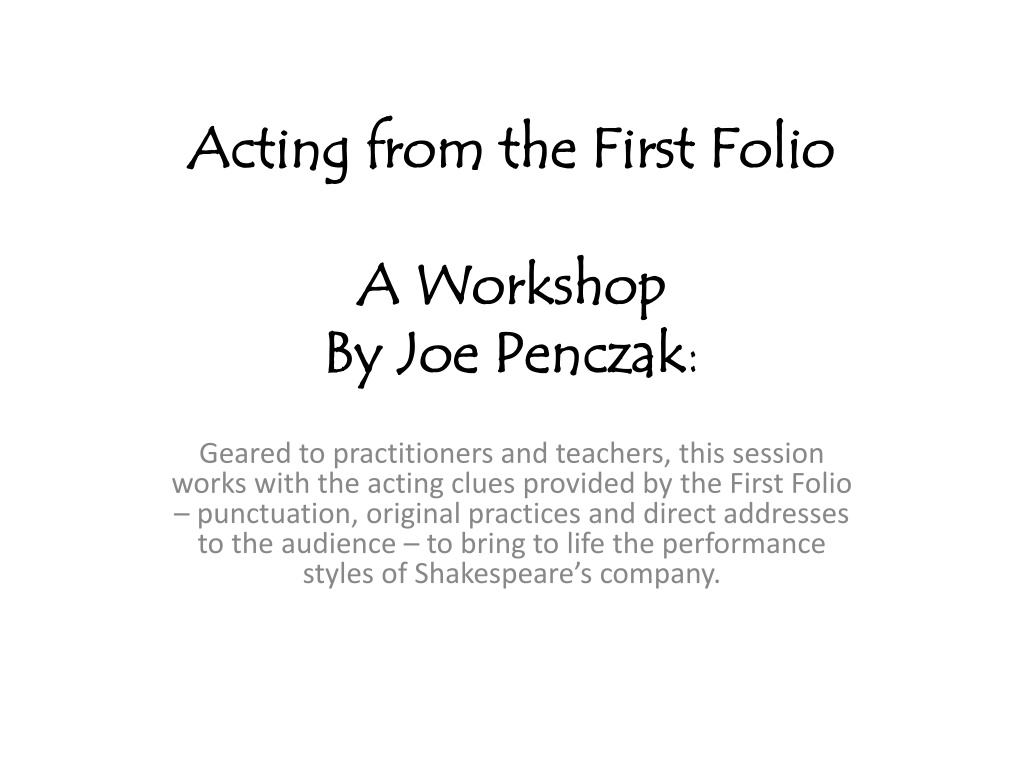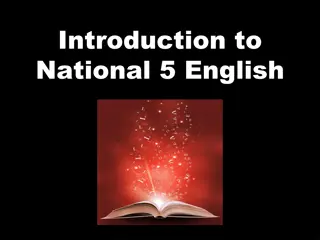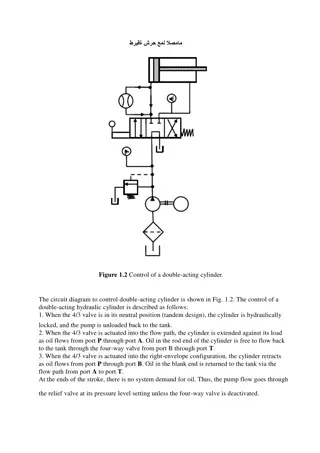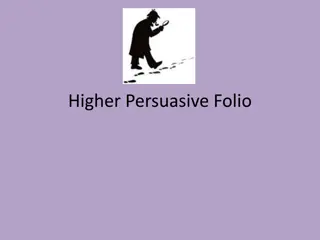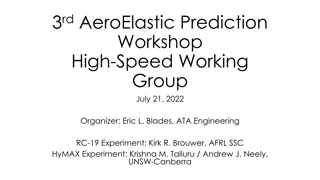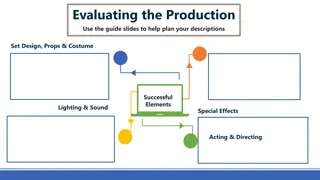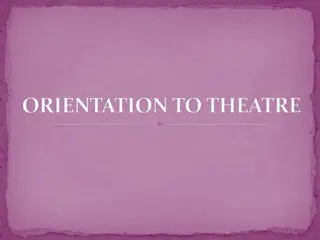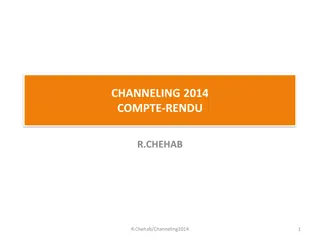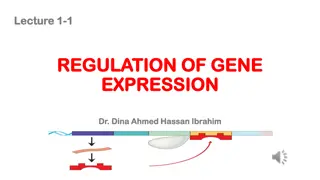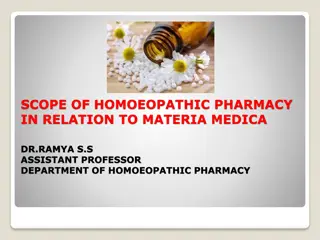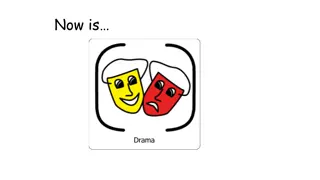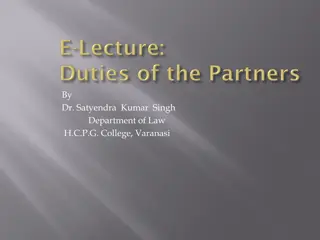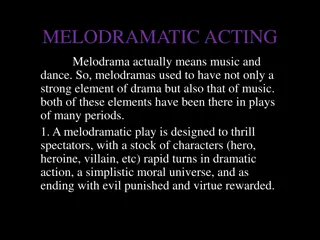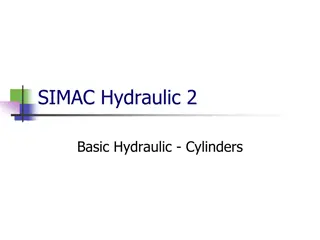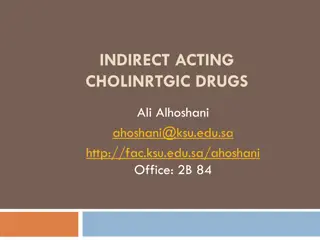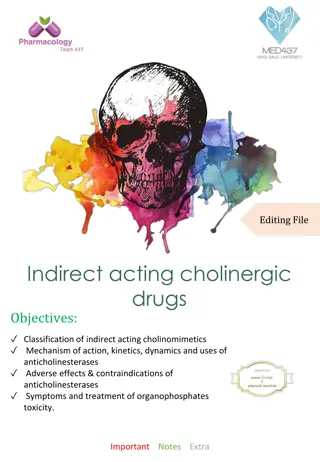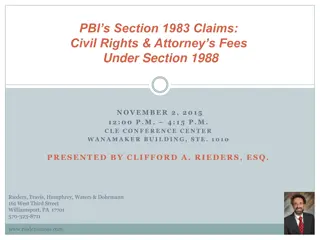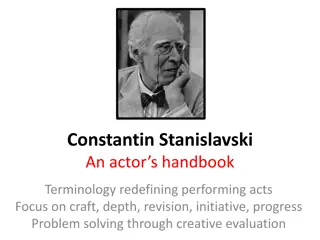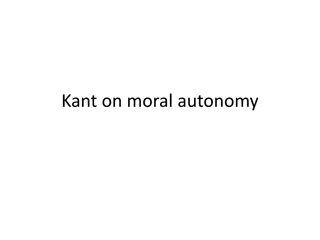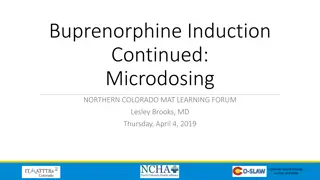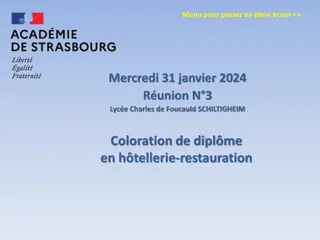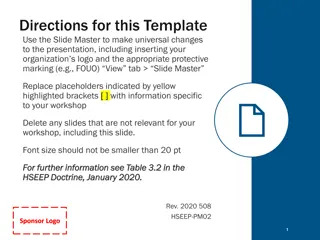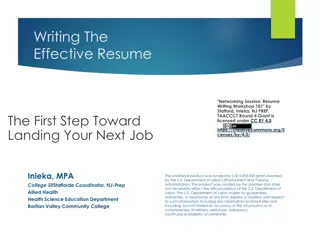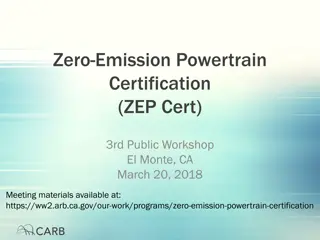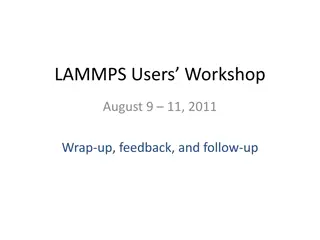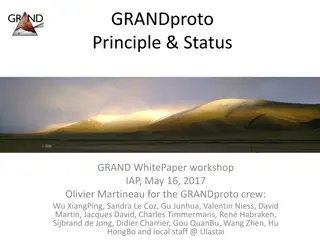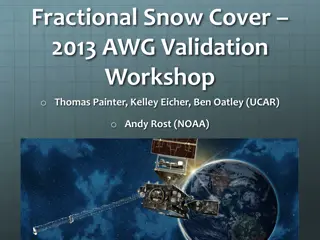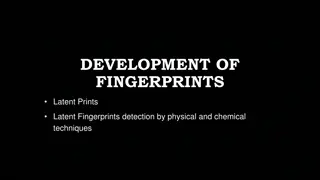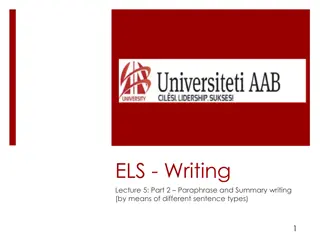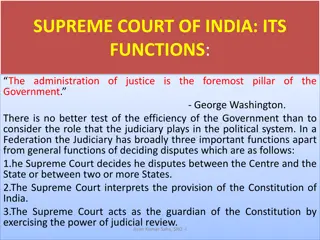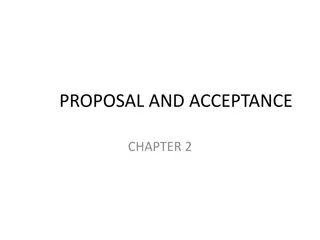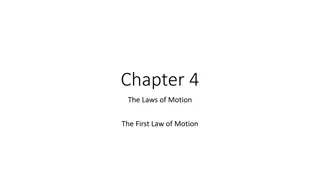Shakespeare's First Folio Workshop: Exploring Original Acting Techniques
Delve into Shakespeare's acting techniques through a workshop that emphasizes using punctuation, original practices, and direct audience engagement from the First Folio. Learn how to bring the Bard's plays to life by following the clues within the text. Key dates in Shakespeare's work publication history are also outlined, providing insight into the evolution of his plays over time.
Download Presentation

Please find below an Image/Link to download the presentation.
The content on the website is provided AS IS for your information and personal use only. It may not be sold, licensed, or shared on other websites without obtaining consent from the author. Download presentation by click this link. If you encounter any issues during the download, it is possible that the publisher has removed the file from their server.
E N D
Presentation Transcript
Acting from the First Folio Acting from the First Folio A Workshop A Workshop By Joe Penczak By Joe Penczak: Geared to practitioners and teachers, this session works with the acting clues provided by the First Folio punctuation, original practices and direct addresses to the audience to bring to life the performance styles of Shakespeare s company.
I hate when a director says to me 'Here's how I envision this scene'...excuse me? It's right here in the script - I 'envisioned' it FOR you. Do what I wrote. If you want to 'envision', you should become a writer. Where the fuck were you when the page was blank? Harlan Ellison
Key Dates For the Publication of Shakespeares Works: First Folio 1623(36ish) Second Folio 1632(36) Theaters closed from 1642-1660 Third Folio additional plays attributed to Shakespeare, most of which (except Pericles) have been rejected) 1663 (second issue-1664, also had 7 Fourth Folio(43) 1664
Key Dates For the Publication of Shakespeares Works (Quartos) : Titus Andronicus, 1594, 1600, 1611 (octavo) Henry VI, Part 2, 1594, 1600, 1619 Henry VI, Part 3, 1595 (octavo), 1600, 1619 Edward III, 1596 Romeo and Juliet, 1597, 1599, 1609 Richard II, 1597, 1598, 1608, 1615 Richard III, 1597, 1598, 1602, 1605, 1612, 1622 Love's Labour's Lost, 1598 Henry IV, Part 1, 1598, 1599, 1604, 1608, 1613, 1622 Henry IV, Part 2, 1600 Henry V, 1600, 1602, 1619 The Merchant of Venice, 1600, 1619 A Midsummer Night's Dream, 1600, 1619 Much Ado About Nothing, 1600 The Merry Wives of Windsor, 1602, 1619 Hamlet, 1603, 1604, 1611 King Lear, 1608, 1619 Troilus and Cressida, 1609 Pericles, Prince of Tyre, 1609, 1611, 1619 Othello, 1622 The Two Noble Kinsmen, 1634. Only in FF: All s Well That Ends Well, Antony and Cleopatra, As You Like It, Comedy of Errors, Coriolanus, Cymbeline, 1 Henry VI, Henry VIII, Julius Caesar, King John, Macbeth, Measure for Measure, Taming of the Shrew, Tempest, Timon of Athens, Twelfth Night, Two Gentlemen of Verona, and Winter s Tale.
Selected Editors of Shakespeare 1709, Nicholas Rowe; octavo, 6 volumes. 1725, Alexander Pope; quarto, 6 volumes. 1733, Lewis Theobald; octavo, 7 volumes. 1744, Thomas Hanmer; quarto, 6 volumes. 1747, William Warburton; octavo, 8 volumes. 1765, Samuel Johnson, The Plays of William Shakespeare; octavo, 8 volumes. 1768, Edward Capell; octavo, 10 volumes. 1773, George Steevens; octavo, 10 volumes. 1790, Edmond Malone; octavo, 10 volumes. The early 19th century saw the first Variorum editions of Shakespeare's works, editions that collated and synthesized the efforts of the editors of the previous century: 1803, the First Variorum edition, edited by Isaac Reed; 21 volumes. 1807, Thomas Bowdler 1813, the Second Variorum, a reprint of the First; 21 volumes. 1821, the Third Variorum, edited by James Boswell; 21 volumes. 1844, J. P. Collier 1853-65, J. O. Halliwell (Halliwell-Phillips) 1863-6, the Cambridge Edition 1864, the Globe edition 1871, New Variorum, Furness (and son) 1921, the New Cambridge edition in 1921, and all modern standard editions inherit primarily from this edition. 1939, Limited Editions Club, Herbert Farjeon 1986, Oxford Shakespeare, Stanley Wells and Gary Taylor.
Neil Freeman Shakespeares First Texts. 1. Reshaping by being Tidy. Adding Punctuation Standardizing Prefixes Changing Stage Directions 2. Reshaping through poetry: Balance/Harmony vs messier Human moments. 3. The Shakespearean Detective. (the 5 maps) The Sentence structures (what lies between periods/full stops) The collection of thoughts within a sentence (what lies between colons and semi-colons) Separate, individual thoughts (what lies between each punctuation mark) More phrasing = character works harder Less phrasing = less rational than modern counterpart Capital letters (what character is focused on) Spellings the sensual dance of active speech Long/short = loss/reward or control/release
Neil Freeman Shakespeares First Texts. Reshaping by being tidy Adding Punctuation 12N 5.1 http://firstfolio.bodleian.ox.ac.uk/text/293 Andrew. I ll help you, Sir Toby, because we'll be dressed together. Toby. Will you help? An ass-head, and a cox- comb and a knave, a thin-faced knave, a gull! But in First Folio: And. Ile helpe you sir Toby, because we'll be drest to gether. Toby. Will you helpe an Asse-head, and a coxcombe, & a knaue: a thin fac'd knaue, a gull? Macbeth. If we should fail? Lady Macbeth. We fail! But screw your courage to the sticking place, And we ll not fail. But in First Folio: Macb. If we should faile? Lady. We faile? But screw your courage to the sticking place, And wee'le not fayle: when Duncan is asleepe, (Whereto the rather shall his dayes hard Iourney Soundly inuite him) his two Chamberlaines Will I with Wine, and Wassell, so conuince, That Memorie, the Warder of the Braine, Shall be a Fume, and the Receit of Reason A Lymbeck onely: when in Swinish sleepe, Their drenched Natures lyes as in a Death, What cannot you and I performe vpon Th'vnguarded Duncan? What not put vpon His spungie Officers? who shall beare the guilt Of our great quell.
Neil Freeman Shakespeares First Texts. Standardizing Prefixes Scene Location/Incident Prefix 1.1 The street fight Wife 1.3 a b Asking for and starting to talk to Juliet getting the nurse to stop talking Wife Old Lady 3.1 The death of her nephew Tybalt Capulet Wife 3.4 Dealing with Paris and her husband about the wedding Lady 3.5 a b c d First comforting Juliet Giving Juliet the news that she is to marry Paris Capulet s entry, having failed to get her agreement Exeiting after Capulet, telling Juliet not to talk to her Lady Mother Lady Mother 4.3 Offering to help Juliet with the wedding dress preparations Mother 4.5 a b Preparing for the wedding festivities Mourning for the daughter she believes to be dead Lady Mother 5.3 Seeing Juliet dead in the tomb Wife
Neil Freeman Shakespeares First Texts. Standardizing Prefixes Scene Location/Incident Prefix 2.1 a b c d Teasing and bragging with Titania s fairy With angry Oberon, who wants revenge on Titania Leaving/returning to Oberon with the magic herb Finding and putting the spell on Lysander Robin Pucke 3.1 a b c First words about the Mechanicals and their lay Talking bout turning Bottom to a stranger Piramus Chasing the Mechanicals and Bottom Robin Pucke 3.2 a b c d e f g h Telling Oberon about Titania, Bottom and the mechanicals Reproaching Oberon for doubting that he had magicked the mortals, too Realizing he has magicked the wrong man Blamed by Oberon for getting the wrong man and told to get Helena Bringing her in Correctly blaming Oberon after all the lovers quarrel Creating the overcast night spell Teasing the lovers/releasing Lysander from the spell Pucker Robin Pucke Robin 4.1 With the reunited Oberon and Titania Robin 5.1 a b First entry to Theseus palace,with broom to clean Final farewell to the audience Pucke Robin
Neil Freeman Shakespeares First Texts. Changing Stage Directions http://firstfolio.bodleian.ox.ac.uk/text/236 Pet. Now by the world, it is a lustie Wench, I loue her ten times more then ere I did, Oh how I long to haue some chat with her. Bap. Wel go with me, and be not so discomfited. Proceed in practise with my yonger daughter, She's apt to learne, and thankefull for good turnes: Signior Petruchio, will you go with vs, Or shall I send my daughter Kate to you. Exit. Manet Petruchio. Pet. I pray you do. Ile attend her heere, _________________________________________________________________ Pet.Marry so I meane sweet Katherine in thy bed: And therefore setting all this chat aside, Thus in plaine termes: your father hath consented That you shall be my wife; your dowry greed on, And will you, nill you, I will marry you. Now Kate, I am a husband for your turne, For by this light, whereby I see thy beauty, Thy beauty that doth make me like thee well Thou must be married to no man but me, Enter Baptista, Gremio, Trayno. For I am he am borne to tame you Kate, And bring you from a wilde Kate to a Kate Conformable as other houshold Kates: Heere comes your father, neuer make deniall, I must, and will haue Katherineto my wife. (daughter? Bap.Now Signior Petruchio, how speed you with my Pet.How but well sir? how but well?
Neil Freeman Shakespeares First Texts. Reshaping through poetry: Balance/Harmony vs messier Human moments. Modern: But, soft! what light through yonder window breaks? It is the east, and Juliet is the sun. Arise, fair sun, and kill the envious moon, Who is already sick and pale with grief, That thou her maid art far more fair than she: Be not her maid, since she is envious; Her vestal livery is but sick and green And none but fools do wear it; cast it off. It is my lady, O, it is my love! O, that she knew she were! She speaks yet she says nothing: what of that? Her eye discourses; I will answer it. I am too bold, 'tis not to me she speaks: Folio: http://firstfolio.bodleian.ox.ac.uk/ff/rom/2/2 But soft, what light through yonder window breaks ? It is the East, and Iuliet is the Sunne, Arise faire Sun and kill the enuious Moone, Who is already sicke and pale with griefe, That thou her Maid art far more faire then she: Be not her Maid since she is enuious, Her Vestal liuery is but sicke and greene, And none but fooles do weare it, cast it off: It is my Lady, O it is my Loue, O that she knew she were, She speakes, yet she sayes nothing, what of that? Her eye discourses, I will answere it: I am too bold 'tis not to me she speakes:
Neil Freeman Shakespeares First Texts. Reshaping through poetry: Balance/Harmony vs messier Human moments. Modern: Lennox. The night has been unruly: where we lay, 10 Our chimneys were blown down; and, as they say, 10 Lamentings heard i' the air; strange screams of death, 10 And prophesying with accents terrible 10-11 Of dire combustion and confused events 10 New hatch'd to the woeful time: the obscure bird 10 Clamour'd the livelong night: some say, the earth 10 Was feverous and did shake. 6-7 Macbeth. 'Twas a rough night. 4 Folio: http://firstfolio.bodleian.ox.ac.uk/ff/mac/2/3 Lenox. The Night ha's been vnruly: 7 Where we lay, our Chimneys were blowne downe, 9 And (as they say) lamentings heard i'th'Ayre; 10 Strange Schreemes of Death, 4 And Prophecying, with Accents terrible, 10-11 Of dyre Combustion, and confus'd Euents, 10 New hatch'd toth'wofull time. 6 The obscure Bird clamor'd the liue-long Night. 10 Some say, the Earth was feuorous, 7-8 And did shake. 3 Macb. 'Twas a rough Night. 4
Neil Freeman Shakespeares First Texts Capital Letters. If the reader/actor simply imagines and sensually explores the capitalized words of each sentence, there is a much better chance of understanding: The personal logic of the character Precisely why she uses such words at such a time The effect s/he wasn t to create in the other person and/or The effect the word has on himn/herself as it is spoken I should not neede, if you were gentle Brutus. Within tho the Bond of Marriage, tell me Brutus, Is it excepted, I should know no Secrets That appertaine to you? Am I your Selfe, But as it were in sort, or limitation? To keepe with you at Meales, comfort your Bed, And talke to you sometimes? Dwell I but in the Suburbs Of your good pleasure? If it be no more, Portia is Brutus Harlot, not his Wife. ----------------------------------------------------------------------- I should not neede, if you were gentle Capital-Letter. Within tho the Capital-Letter of Capital-Letter, tell me Capital-Letter, Is it excepted, I should know no Capital-Letters That appertaine to you? Am I your Capital-Letter, But as it were in sort, or limitation? To keepe with you at Capital-Letters, comfort your Capital-Letter, And talke to you sometimes? Dwell I but in the Capital-Letters Of your good pleasure? If it be no more, Capital-Letter is Capital-Letter Capital-Letter, not his Capital-Letter. Note: 13 capitalized words out of 78 (17%), compared with 24 out of 308 in the scene so far(8%) 5 of 7 lines in this speech are longer than 10 syllables, suggesting she is struggling, not always successfully, to control her emotions. Summary: There is mental energy in the capital, suggesting the finding of the right word, thus reflecting logic in the matter Extra clusters of capitals suggest sudden repeated piercing insights, indicating manner as well as matter of discovery Double-flag moments when capital comes immediately after a colon: suggests enormous insight demands passion Sustained passages of capitals followed by none, may be reflective of changes in the energy of a character or scene May reflect a character having fun with the argument
Neil Freeman Shakespeares First Texts Spellings. Spellings seem to show the release of, harmony with, or clamping down on, the passions of the moment. Long spellings - The character is moved by the image to release more of a personal reaction Short spellings character is recoiling from an image, or attempting to hold back their emotions The Crickets sing, and mans ore-labor'd sense Repaires it selfe by rest: Our Tarquine thus Did softly presse the Rushes, ere he waken'd The Chastitie he wounded. Cytherea, How brauely thou becom'st thy Bed; fresh Lilly, And whiter then the Sheetes: that I might touch, But kisse, one kisse. Rubies vnparagon'd, How deerely they doo't: 'Tis her breathing that Perfumes the Chamber thus: the Flame o'th'Taper Bowes toward her, and would vnder-peepe her lids. To see th'inclosed Lights, now Canopied Vnder these windowes, White and Azure lac'd With Blew of Heauens owne tinct. But my designe. To note the Chamber, I will write all downe, Such, and such pictures: There the window, such Th'adornement of her Bed; the Arras, Figures, Why such, and such: and the Contents o'th'Story. Ah, but some naturall notes about her Body, Aboue ten thousand meaner Moueables Would testifie, t'enrich mine Inuentorie. O sleepe, thou Ape of death, lye dull vpon her, And be her Sense but as a Monument, Thus in a Chappell lying. Come off, come off; As slippery as the Gordian-knot was hard. 'Tis mine, and this will witnesse outwardly, As strongly as the Conscience do's within: To'th'madding of her Lord. On her left brest A mole Cinque-spotted: Like the Crimson drops I'th'bottome of a Cowslippe. Heere's a Voucher, Stronger then euer Law could make; this Secret Will force him thinke I haue pick'd the lock, and t'ane The treasure of her Honour. No more: to what end? Why should I write this downe, that's riueted, Screw'd to my memorie. She hath bin reading late, The Tale of Tereus, heere the leaffe's turn'd downe Where Philomele gaue vp. I haue enough, To'th'Truncke againe, and shut the spring of it. Swift, swift, you Dragons of the night, that dawning May beare the Rauens eye: I lodge in feare, Though this a heauenly Angell: hell is heere.
Bill Kincaid Performing Shakespeare Unrehearsed When you say this or here, touch the object or person When you say that or there, create distance from the object or person Group on the words we, us, and our Invade the other character s space on thou, thee, thine, and thyself Create distance from the other character on you, your, and yourself. When you name a character, cross to them. If you name no one, cross to the person who spoke your cue. Follow stage directions given to you by other actors. Throw stage directions in your own lines to your fellow actors. Suit the action to the verb when talking about immediate actions, but not when talking about action at a specific future time. Suit action to the word when describing behaviors or states of being, unless they are impossible. Step forward when your character is addressed by name. Involve the audience whenever possible, as crowds, props, or confidantes. If you have the first line of a scene, enter speaking If you have the last line of a scene, exit speaking Unrehearsed does not mean unprepared.
Bill Kincaid Performing Shakespeare Unrehearsed Thee/Thou King Lear Act 4, Scene 4 http://firstfolio.bodleian.ox.ac.uk/ff/lr/4/4 Enter Regan, and Steward. Reg. But are my Brothers Powres set forth? Stew. I Madam. Reg. Himselfe in person there? Stew. Madam with much ado: Your Sister is the better Souldier. Reg. Lord Edmund spake not with your Lord at home? Stew. No Madam. Reg. What might import my Sisters Letter to him? Stew. I know not, Lady. Reg. Faith he is poasted hence on serious matter: It was great ignorance, Glousters eyes being out To let him liue. Where he arriues, he moues All hearts against vs: Edmund, I thinke is gone In pitty of his misery, to dispatch His nighted life: Moreouer to descry The strength o'th' Enemy. Stew. I must needs after him, Madam, with my Letter. Reg. Our troopes set forth to morrow, stay with vs: The wayes are dangerous. Stew. I may not Madam: My Lady charg'd my dutie in this busines. Reg. Why should she write to Edmund? Might not you transport her purposes by word? Belike, Some things, I know not what. Ile loue thee much Let me vnseale the Letter. Stew. Madam, I had rather Reg. I know your Lady do's not loue her Husband, I am sure of that: and at her late being heere, She gaue strange Eliads, and most speaking lookes To Noble Edmund. I know you are of her bosome. Stew. I, Madam? Reg. I speake in vnderstanding: Y'are: I know't, Therefore I do aduise you take this note: My Lord is dead: Edmond, and I haue talk'd, And more conuenient is he for my hand Then for your Ladies: You may gather more: If you do finde him, pray you giue him this; And when your Mistris heares thus much from you, I pray desire her call her wisedome to her. So fare you well: If you do chance to heare of that blinde Traitor, Preferment fals on him, that cuts him off. Stew. Would I could meet Madam, I should shew What party I do follow. Reg. Fare thee well. Exeunt.
Thee/Thou; Rhyming Couplet to end a scene Macbeth Act 1, Scene 5] .Enter Macbeth. Lady. Great Glamys, worthy Cawdor, Greater then both, by the all-haile hereafter, Thy Letters haue transported me beyond This ignorant present, and I feele now The future in the instant. Macb. My dearest Loue, Duncan comes here to Night. Lady. And when goes hence? Macb. To morrow, as he purposes. Lady. O neuer, Shall Sunne that Morrow see. Your Face, my Thane, is as a Booke, where men May reade strange matters, to beguile the time. Looke like the time, beare welcome in your Eye, Your Hand, your Tongue: looke like th'innocent flower, But be the Serpent vnder't. He that's comming, Must be prouided for: and you shall put This Nights great Businesse into my dispatch, Which shall to all our Nights, and Dayes to come, Giue solely soueraigne sway, and Masterdome. Macb. We will speake further. Lady.Onely looke vp cleare: To alter fauor, euer is to feare: Leaue all the rest to me. Exeunt.
Scena Septima. [Act 1, Scene 7] Ho-boyes. Torches. Enter a Sewer, and diuers Seruants with Dishes and Seruice ouer the Stage. Then enter Macbeth. Macb. If it were done, when 'tis done, then 'twer well, It were done quickly: If th'Assassination Could trammell vp the Consequence, and catch With his surcease, Successe: that but this blow Might be the be all, and the end all. Heere, But heere, vpon this Banke and Schoole of time, Wee'ld iumpe the life to come. But in these Cases, We still haue iudgement heere, that we but teach Bloody Instructions, which being taught, returne To plague th'Inuenter, This euen-handed Iustice Commends th'Ingredience of our poyson'd Challice To our owne lips. Hee's heere in double trust; First, as I am his Kinsman, and his Subiect, Strong both against the Deed: Then, as his Host, Who should against his Murtherer shut the doore, Not beare the knife my selfe. Besides, this Duncane Hath borne his Faculties so meeke; hath bin So cleere in his great Office, that his Vertues Will pleade like Angels, Trumpet-tongu'd against The deepe damnation of his taking off: And Pitty, like a naked New-borne-Babe, Striding the blast, or Heauens Cherubin, hors'd Vpon the sightlesse Curriors of the Ayre, Shall blow the horrid deed in euery eye, That teares shall drowne the winde. I haue no Spurre To pricke the sides of my intent, but onely Vaulting Ambition, which ore-leapes it selfe, And falles on th'other. How now? What Newes? La. He has almost supt: why haue you left the chamber? Mac. Hath he ask'd for me ? La. Know you not, he ha's? Mac. We will proceed no further in this Businesse: He hath Honour'd me of late, and I haue bought Golden Opinions from all sorts of people, Which would be worne now in their newest glosse, Not cast aside so soone. La.Was the hope drunke, Wherein you drest your selfe? Hath it slept since? And wakes it now to looke so greene, and pale, At what it did so freely? From this time, Such I account thy loue. Art thou affear'd To be the same in thine owne Act, and Valour, As thou art in desire? Would'st thou haue that Which thou esteem'st the Ornament of Life, And liue a Coward in thine owne Esteeme? Letting I dare not, wait vpon I would, Like the poore Cat i'th'Addage. Macb. Prythee peace: I dare do all that may become a man, Who dares do more, is none. La. What Beast was't then That made you breake this enterprize to me? When you durst do it, then you were a man: And to be more then what you were, you would Be so much more the man. Nor time, nor place Did then adhere, and yet you would make both: They haue made themselues, and that their fitnesse now Do's vnmake you. I haue giuen Sucke, and know How tender 'tis to loue the Babe that milkes me, I would, while it was smyling in my Face, Haue pluckt my Nipple from his Bonelesse Gummes, And dasht the Braines out, had I so sworne As you have done to this. Macb. If we should faile? Lady. We faile? But screw your courage to the sticking place, And wee'le not fayle: when Duncan is asleepe, (Whereto the rather shall his dayes hard Iourney Soundly inuite him) his two Chamberlaines Will I with Wine, and Wassell, so conuince, That Memorie, the Warder of the Braine, Shall be a Fume, and the Receit of Reason A Lymbeck onely: when in Swinish sleepe, Their drenched Natures lyes as in a Death, What cannot you and I performe vpon Th'vnguarded Duncan? What not put vpon His spungie Officers? who shall beare the guilt Of our great quell. Macb. Bring forth Men-Children onely: For thy vndaunted Mettle should compose Nothing but Males. Will it not be receiu'd, When we haue mark'd with blood those sleepie two Of his owne Chamber, and vs'd their very Daggers, That they haue don't? Lady. Who dares receiue it other, As we shall make our Griefes and Clamor rore, Vpon his Death? Macb. I am settled, and bend vp Each corporall Agent to this terrible Feat. Away, and mock the time with fairest show, False Face must hide what the false Heart doth know. Enter Lady. Exeunt.
Pet.I sweare Ile cuffe you, if you strike againe. Kate.So may you loose your armes, If you strike me, you are no Gentleman, And if no Gentleman, why then no armes. Pet.A Herald Kate? Oh put me in thy bookes. Kate.What is your Crest, a Coxcombe? Pet.A comblesse Cocke, so Kate will be my Hen. Kate.No Cocke of mine, you crow too like a crauen Pet.Nay come Kate, come: you must not looke so sowre. Kate.It is my fashion when I see a Crab. Pet.Why heere's no crab, and therefore looke not sowre. Kate.There is, there is. Pet.Then shew it me. Kate.Had I a glasse, I would. Pet.What, you meane my face. Kate.Well aym'd of such a yong one. Pet.Now by (S.)Saint George I am too yong for you. Kate.Yet you are wither'd. Pet.'Tis with cares. Kate.I care not. Pet.Nay heare you Kate. Insooth you scape not so. Kate.I chafe you if I tarrie. Let me go. Pet.No, not a whit, I finde you passing gentle: 'Twas told me you were rough, and coy, and sullen, And now I finde report a very liar: For thou art pleasant, gamesome, passing courteous, But slow in speech: yet sweet as spring-time flowers. Thou canst not frowne, thou canst not looke a sconce, Nor bite the lip, as angry wenches will, Nor hast thou pleasure to be crosse in talke: But thou with mildnesse entertain'st thy wooers, With gentle conference, soft, and affable. Why does the world report that Kate doth limpe? Oh sland'rous world: Kate like the hazle twig Is straight, and slender, and as browne in hue As hazle nuts, and sweeter then the kernels: Oh let me see thee walke: thou dost not halt. Kate.Go foole, and whom thou keep'st command. Pet.Did euer Dian so become a Groue As Kate this chamber with her princely gate: O be thou Dian, and let her be Kate, And then let Kate be chaste, and Dian sportfull. Taming of The Shrew Act 2 Scene 1 Enter Katerina. Good morrow Kate, for thats your name I heare. Kate.Well haue you heard, but something hard of hearing: They call me Katerine, that do talke of me. Pet.You lye infaith, for you are call'd plaine Kate, And bony Kate, and sometimes Kate the curst: But Kate, the prettiest Kate in Christendome, Kate of Kate-hall, my super-daintie Kate, For dainties are all Kates, and therefore Kate Take this of me, Kate of my consolation, Hearing thy mildnesse prais'd in euery Towne, Thy vertues spoke of, and thy beautie sounded, Yet not so deepely as to thee belongs, My selfe am moou'd to woo thee for my wife. Kate. Mou d, in good time, let him that mou'd you hether Remoue you hence: I knew you at the first You were a mouable. Pet. Why, what s a mouable? Kat. A ioyn d stoole. Pet. Thou hast hit it: come sit on me. Kate.Asses are made to beare, and so are you. Pet.Women are made to beare, and so are you. Kate.No such Iade as you, if me you meane. Pet.Alas good Kate, I will not burthen thee, For knowing thee to be but yong and light. Kate.Too light for such a swaine as you to catch, And yet as heauie as my waight should be. Pet.Shold be, should: buzze. Kate.Well tane, and like a buzzard. Pet.Oh slow-wing'd Turtle, shal a buzard take thee? Kat.I for a Turtle, as he takes a buzard. Pet.Come, come you Waspe, y'faith you are too angrie. Kate.If I be waspish, best beware my sting. Pet.My remedy is then to plucke it out. Kate.I, if the foole could finde it where it lies. Pet.Who knowes not where a Waspe does weare his sting? In his taile. Kate.In his tongue? Pet.Whose tongue. Kate.Yours if you talke of tales, and so farewell. Pet.What with my tongue in your taile. Nay, come againe, good Kate, I am a Gentleman, Kate.That Ile trie. She strikes him Kate.Where did you study all this goodly speech? Petr.It is extempore, from my mother wit. Kate.A witty mother, witlesse else her sonne. Pet.Am I not wise? Kat.Yes, keepe you warme. Pet.Marry so I meane sweet Katherine in thy bed: And therefore setting all this chat aside, Thus in plaine termes: your father hath consented That you shall be my wife; your dowry greed on, And will you, nill you, I will marry you. Now Kate, I am a husband for your turne, For by this light, whereby I see thy beauty, Thy beauty that doth make me like thee well Thou must be married to no man but me, Enter Baptista, Gremio, Trayno. For I am he am borne to tame you Kate, And bring you from a wilde Kate to a Kate Conformable as other houshold Kates: Heere comes your father, neuer make deniall, I must, and will haue Katherine to my wife. And
Ang.I thinke it well: And from this testimonie of your owne sex (Since I suppose we are made to be no stronger Then faults may shake our frames) let me be bold; I do arrest your words. Be that you are, That is a woman; if you be more, you'r none. If you be one (as you are well exprest By all externall warrants) shew it now, By putting on the destin'd Liuerie. Isa.I haue no tongue but one; gentle my Lord, Let me entreate you speake the former language. Ang.Plainlie conceiue I loue you. Isa.My brother did loue Iuliet, And you tell me that he shall die for't. Ang.He shall not Isabell if you giue me loue. Isa.I know your vertue hath a licence in't, Which seemes a little fouler then it is, To plucke on others. Ang.Beleeue me on mine Honor, My words expresse my purpose. Isa.Ha? Little honor, to be much beleeu'd, And most pernitious purpose: Seeming, seeming. I will proclaime thee Angelo, looke for't. Signe me a present pardon for my brother, Or with an out-stretcht throate Ile tell the world aloud What man thou art. Ang.Who will beleeue thee Isabell? My vnsoild name, th' austeerenesse of my life, My vouch against you, and my place i'th State, Will so your accusation ouer-weigh, That you shall stifle in your owne reporr, And smell of calumnie. I haue begun, And now I giue my sensuall race, the reine, Fit thy consent to my sharpe appetite, Lay by all nicetie, and prolixious blushes That banish what they sue for: Redeeme thy brother, By yeelding vp thy bodie to my will, Or else he must not onelie die the death, But thy vnkindnesse shall his death draw out To lingring sufferance: Answer me to morrow, Or by the affection that now guides me most, Ile proue a Tirant to him. As for you, Say what you can; my false, ore-weighs your true. Measure, For Measure Act 2 scene 4 Ang.Admit no other way to saue his life (As I subscribe not that, nor any other, But in the losse of question) that you, his Sister, Finding your selfe desir'd of such a person, Whose creadit with the Iudge, or owne great place, Could fetch your Brother from the Manacles Of the all-building-Law: and that there were No earthly meane to saue him, but that either You must lay downe the treasures of your body, To this supposed, or else to let him suffer: What would you doe? Isab.As much for my poore Brother, as my selfe; That is: were I vnder the tearmes of death, Th'impression of keene whips, I'ld weare as Rubies, And strip my selfe to death, as to a bed, That longing haue bin sicke for, ere I'ld yeeld My body vp to shame. Ang.Then must your brother die. Isa.And 'twer the cheaper way: Better it were a brother dide at once, Then that a sister, by redeeming him Should die for euer. Ang.Were not you then as cruell as the Sentence, That you haue slander'd so? Isa.Ignomie in ransome, and free pardon Are of two houses: lawfull mercie, Is nothing kin to fowle redemption. Ang.You seem'd of late to make the Law a tirant, And rather prou'd the sliding of your brother A merriment, then a vice. Isa.Oh pardon me my Lord, it oft fals out To haue, what we would haue, We speake not what we meane; I something do excuse the thing I hate, For his aduantage that I dearely loue. Ang.We are all fraile. Isa.Else let my brother die, If not a fedarie but onely he Owe, and succeed thy weaknesse. Ang.Nay, women are fraile too. Isa.I, as the glasses where they view themselues, Which are as easie broke as they make formes: Women? Helpe heauen; men their creation marre In profiting by them: Nay, call vs ten times fraile, For we are soft, as our complexions are, And credulous to false prints. Isa.To whom should I complaine? Did I tell this, Who would beleeue me? O perilous mouthes That beare in them, one and the selfesame tongue, Either of condemnation, or approofe, Bidding the Law make curtsie to their will, Hooking both right and wrong to th' appetite, To follow as it drawes. Ile to my brother, Though he hath falne by prompture of the blood, Yet hath he in him such a minde of Honor, That had he twentie heads to tender downe On twentie bloodie blockes, hee'ld yeeld them vp, Before his sister should her bodie stoope To such abhord pollution. Then Isabell liue chaste, and brother die; More then our Brother, is our Chastitie. Ile tell him yet of Angelo's request, And fit his minde to death, for his soules rest. Exit. Exit.
Cue Sheets (Tucker, Palfrey, Stern p199-202) Ant. Well Shylocke, shall we be beholding to you ? Ant. Well Shylocke, shall we be beholding to you ? Shy. Signior Anthonio, many a time and oft In the Ryalto you haue rated me About my monies and my vsances: Still haue I borne it with a patient shrug, (For suffrance is the badge of all our Tribe.) You call me misbeleeuer, cut-throate dog, And spet vpon my Iewish gaberdine, And all for vse of that which is mine owne. Well then, it now appeares you neede my helpe Goe to then, you come to me, and you say, Shylocke, we would haue moneyes, you say so: You that did voide your rume vpon my beard, And foote me as you spurne a stranger curre Ouer your threshold, moneyes is your suite. What should I say to you? Should I not say, Hath a dog money? Is it possible A curre should lend three thousand ducats? Or Shall I bend low, and in a bond-mans key With bated breath, and whispring humblenesse, Say this: Faire sir, you spet on me on Wednesday last; You spurn'd me such a day; another time You cald me dog: and for these curtesies Ile lend you thus much moneyes. . monies Ant. I am as like to call thee so againe, To spet on thee againe, to spurne thee too. If thou wilt lend this money, lend it not As to thy friends, for when did friendship take A breede of barraine mettall of his friend? But lend it rather to thine enemie, Who if he breake, thou maist with better face Exact the penalties. Ant. I am as like to call thee so againe, To spet on thee againe, to spurne thee too. If thou wilt lend this money, lend it not As to thy friends, for when did friendship take A breede of barraine mettall of his friend? But lend it rather to thine enemie, Who if he breake, thou maist with better face Exact the penalties. Shy. Why looke you how you storme, I would be friends with you, and haue your loue, Forget the shames that you haue staind me with, Supplie your present wants, and take no doite Of vsance for my moneyes, and youle not heare me, This is kinde I offer. Bass. This were kindnesse. Shy. This kindnesse will I showe, Goe with me to a Notarie, seale me there Your single bond, and in a merrie sport
Cue Sheets (Tucker, Palfrey, Stern) Enter the Jew, and Solanio, and Anthonio, and the Jaylor. Jew. Jaylor, looke to him, tell not me of mercy, This is the foole that lends out money gratis. Jaylor, looke to him. Ant. Heare me yet good Shylok. Jew. Ile haue my bond, speake not against my bond, I haue sworne an oath that I will haue my bond: Thou call'dst me dog before thou hadst a cause, But since I am a dog, beware my phangs, The Duke shall grant me iustice, I do wonder Thou naughty Jaylor, that thou art so fond To come abroad with him at his request. Ant. I pray thee heare me speake. Jew. Ile haue my bond, I will not heare thee speake, Ile haue my bond, and therefore speake no more, Ile not be made a soft and dull ey'd foole, To shake the head, relent, and sigh, and yeeld To Christian intercessors: follow not, Ile haue no speaking, I will haue my bond. Exit Iew. Antonio s sides: .. Jaylor, looke to him Ant. Heare me yet good Shylok. .. . at his request. Ant. I pray thee heare me speake. Solanio s sides: .. haue my bond. Sol. It is the most impenetrable curre That euer kept with men. Sol. It is the most impenetrable curre That euer kept with men.
Selected Bibliography Shakespearean Punctuation, 1911, Percy Simpson (see pdf p74 for TOTS reference) Shakespeare's Producing Hand: A Study of His Marks of Expression to be Found in the First Folio Richard Flatter, 1948 The Norton Facsimile (the First folio of Shakespeare), Charlton Hinman, 1968 Shakespeare s First Texts, Neil Freeman, 1994 Rehearsal from Shakespeare to Sheridan, Tiffany Stern, 2000 Secrets of Acting Shakespeare The Original Approach, Patrick Tucker, 2001 Acting from Shakespeare's First Folio: Theory, Text and Performance Don Weingust, 2007 Shakespeare in Parts, Tiffany Stern and Simon Palfrey, Nov. 2007 The Tragedie of Macbeth: A Frankly Annotated First Folio Edition, Demitra Papadinis, 2012 Shakespeare s Authentic Performance Texts: The Case for Staging from the First Folio, Graham Watts, 2015 Performing Shakespeare Unrehearsed , Bill Kincaid, 2018 Shakespeare and the History of Soliloquies, James Hirsh, 2003 The Shakespearean Inside, A Study of the Complete Soliloquies, and Solo Asides, Macus Nordlund, 2017
